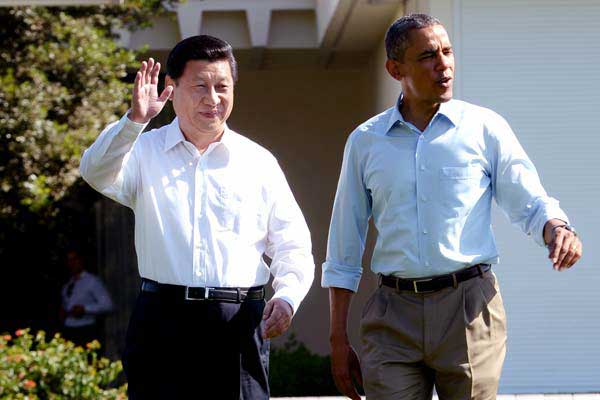 |
|
President Xi Jinping, left, and his US counterpart Barack Obama walk at the Annenberg Retreat of the Sunnylands estate in Rancho Mirage, California, June 2013. [Photo/Xinhua] |
Despite the fact that some in the US have low expectations for President Xi's visit, I think that there is a strong possibility for significant progress on matters such as the Bilateral Investment Treaty that would further open China and US markets to each other, not only financially but knowledge-wise. We can also expect progress on environmental issues and military relations. The visit will encourage both sides to address the thorny and complicated cyberspace dispute which is poisoning relations between the two powers.
I'm old enough to remember Deng Xiaoping's visit to the US in 1979 and have branded into my brain that image of him wearing a 10 gallon hat at a Texas rodeo. I remember that he kissed a lot of kids at the Kennedy Center in Washington. These might seem trivial in the scheme of things but they aren't. President Xi and his wife are the living embodiment of China, a country that fascinates and worries us. I believe that the Chinese couple's visit will help Americans know China better and help us connect on a more human and emotional level.
In my opinion, China and the US are the very best of frenemies—friends and enemies. But like a married couple in a love-hate relationship in a place that doesn't't allow divorce, we have to find common ground. Henry Kissinger said recently that when China and the US established their new relationship beginning in 1972, we had a common adversary but now we only have common opportunities. As difficult as they are to grasp, for the sake of the future of the world, we have to do so.
It's true that throughout history, a rising power and the established one have usually come to blows but not universally so. Professor Graham Allison of Harvard calls this the "Thucydides' trap." But being the counterexample takes lots of effort and we need to work much harder. If we rise above the fray, this century can be the Sino-American century and we can more or less peacefully co-exist.
Maybe some American officials reject this new power relationship. They're mired in the idea of American exceptionalism and that only the US can be the world's policeman and its sole political beacon. Many people who think like this are American neo-conservatives—the ones who believed that if we introduced democracy to Iraq, everything would be OK. Well, it isn't OK!
It's clear as a bell that these best of frenemies have to do all in their power to avoid the Thucydides trap. This takes hard work. One ray of hope is the ongoing Strategic and Economic Dialogues. So is President Xi's state visit. As long as we keep talking, the chances of untoward events occurring are vastly reduced.
I do believe that we need to make every effort to know each other better on the people-to-people level. With ease of travel and being able to communicate in different languages with ingenious technologies like WeChat, this is no longer difficult.
The author is a senior adviser to Tsinghua University and former director and vice-president of ABC Television in New York.